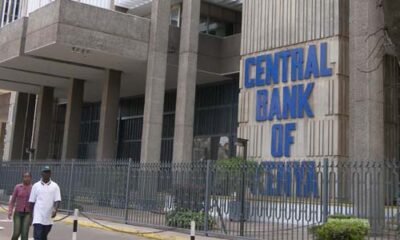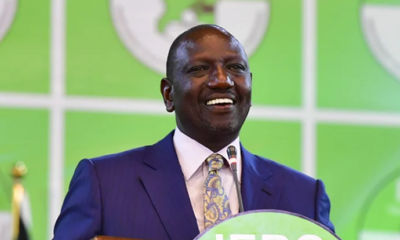Strictly Personal
Western Sahara: Has Moroccan diplomacy really failed in Kenya? By Samir Bennis
Published
1 year agoon

Every time Western Sahara is discussed at a regional or international level, some commentators rush to criticize Moroccan diplomacy for any potential small setbacks.
Carried away on the spur of the moment, without taking the necessary time or distance to analyze the topic in its broader political and geopolitical context, these social commentators tend to dismiss all the breakthroughs that Morocco has achieved over the past decade. Ultimately, theirs is a doomsday narrative driven by the need to show that Morocco is about to be swept away by its adversaries.
This tendency to read the latest developments of the Western Sahara dispute with a high dose of sensationalism and disregard for facts and context was made evident on Thursday last week following the Security Council’s adoption of Resolution 2654, which extended the United Nations peacekeeping mission to Western Sahara for one year until October 31, 2023.
A holdover from the past
With one of the episode’s key highlights being Kenya’s choice to abstain from voting and join Russia in breaking the consensus, some have been quick to downplay and question Kenya’s emerging, perceptibly pro-Morocco approach to the Sahara dispute.
Shortly after his inauguration as Kenya’s president-elect in September, William Ruto met with Morocco’s Minister of Foreign Affairs Nasser Bourita to confirm his long-expressed intention to sever relations between his country and the Algeria-backed, self-proclaimed Sahrawi Arab Democratic Republic (SADR).
Still, some saw Kenya’s abstention on October 27 as a sign that Nairobi is not truly committed to Ruto’s expressed support for Morocco.
These criticisms would have been warranted and well-founded had the Kenyan ambassador to the United Nations been appointed by the new president. Yet, many who were quick to point to the alleged failure of Morocco’s diplomacy failed to see that the current Kenyan ambassador is but a holdout of the government of former President Kenyatta, a loyal ally of Algeria.
What’s more, this same ambassador has since his appointment two years ago, coinciding with the election of his country as a member of the Security Council, spared no effort to blunt Morocco’s diplomatic momentum in the Western Sahara debate. Also overlooked by these observers is that the Kenyan diplomat is spending his last days in his post in New York for a simple but very important reason: the new government appointed by President Ruto will take over the reins of power in the country this Friday after it was sworn in before the president on Thursday. October 28.
Signs of changing tides
But what does that mean in practice? For one thing, it means that the current Kenyan ambassador to the United Nations, a member of the old guard and a close confidant of former President Kenyatta, was keen to assume the same position adopted by the outgoing government, not caring about the stance that the new government might take. Pending the inauguration of the new Ruto-appointed government, which obtained the confidence of parliament on Wednesday, October 26, Kenya had been led by a caretaker government.
Among those who took part in the swearing-in ceremony last Thursday was Alfred Mutua, who took over as Minister of Foreign Affairs. Prior to assuming his new position, Mutua was among the many high-level Kenyan personalities that maintained a friendly relationship with Mokhtar Ghambo, Morocco’s former ambassador to Kenya. Like his president, when Mutua met with the Moroccan diplomat, he expressed good dispositions to strive towards a rapprochement between Rabat and Nairobi.
Algerian influences
To understand how the Kenyan ambassador’s vote is part of Algeria’s desperate attempts to give the impression that Kenya has not abandoned its traditional position that challenges Morocco’s territorial integrity, we should more carefully read the Kenyan ambassador’s text when explaining his vote on the resolution.
The text was a carbon copy of Algeria’s narrative, especially promoting its decades-old claims that Resolution 690 of 1991 is still considered the guiding principle for the UN-led political process. In reality, however, this is outdated and inconsistent with all the resolutions the Security Council has adopted since 2007.
In addition, the Kenyan ambassador’s text stressed the need for the African Union to play a pivotal role in the political process under the auspices of the United Nations. Further supporting the hypothesis of last-minute Algerian influences on Kenya’s current UN ambassador is that the same Kenyan UN representative had no qualms about voting yes for Resolution 2602 in October 2021 when he was president of the Security Council. The language he used when explaining his vote in favor of that resolution was significantly different from the language he used this time to explain his reasons for abstaining.
Why abstain?
At a time when Kenya is going through a political transition, and just hours away from the inauguration of its new government (whose president announced a few weeks ago his intention to get closer to Morocco), what are the reasons behind this radical shift in the Kenyan position?
The most logical reason is that Kenya’s outgoing ambassador was keen to pass on a message to the Algerian regime that a large part of the old guard in Kenya is still ready to support it and to sabotage the current government’s efforts to strengthen ties with Morocco, even after its departure from power.
This effort is not free, however, because the old guard is convinced that Algeria is ready to spend some of its oil revenues to help them return to power in 2027 and guarantee them privileges that would let them live in luxurious conditions at the expense of Algerians who struggle to procure basic commodities, including oil, flour, sugar, vegetables, and fruits.
Here, one must recall the bizarre incident that happened a few days after the newly elected president expressed his intention to reconsider his country’s diplomatic ties with the self-styled SADR. The Kenyan Ministry of Foreign Affairs circulated a diplomatic note in which it claimed that its position on Western Sahara had not changed.
The note went as far as to harshly criticize the president by emphasizing that Kenya’s foreign policy is not conducted through social media. It later turned out that the note did not come from the President’s office, but rather from the old guard that Algeria has historically relied on to advance its agenda. Macharia Kamu,, the official who authored that circular has just been dismissed by the Kenyan President and replaced by Mr. Korir Sing’oei.
Context in Kenya
No one can comment on the Kenyan ambassador’s position without considering the overall context stemming from the political strife in Kenya following the inauguration of President Ruto. This context is marked by attempts from many figures pushing to maintain the old guard’s foreign policy positions, in blatant disregard for the vital interests of Kenya and the new government’s perceived determination to strengthen relations with Morocco.
Stronger ties with Morocco can help Kenya benefit from the North African country’s expertise at different levels, including boosting food security. Faced with water scarcity and the high cost of fertilizers, Kenya is highly dependent on agriculture, which represents 30% its of economy.
Given this highly sensitive context of the Kenyan old guard’s struggle to resist, even derail the foreign policy changes promised by the country’s new authorities, it makes little or no sense to rush to the conclusion that the Kenyan UN representative’s abstention this past Thursday constitutes a major setback for Moroccan diplomacy.
As such, it would be more judicious to allow some time to pass and wait until the new government takes the reins. Only then could we have a clearer idea about the direction of the new Kenyan government and be able to assess whether Moroccan diplomacy achieved any success in Kenya.
Samir Bennis is the co-founder of Morocco World News. You can follow him on Twitter @SamirBennis.
You may like
-


Investors’ wealth drops by $968 million on Nairobi Securities Exchange
-


This is chaos, not governance, and we must stop it, By Tee Ngugi
-


US faults Kenya’s financial management system portal
-


Kenya’s Daniel Simiu dominates Berlin Half Marathon as country completes clean sweep
-


Kenya’s Sabastian Sawe soars to victory at Prague Half-Marathon
-


Video: Kenya’s Ruto argues for reduced budget deficit, public debt
Strictly Personal
Air Peace, capitalism and national interest, By Dakuku Peterside
Published
2 days agoon
April 16, 2024
Nigerian corporate influence and that of the West continue to collide. The rationale is straightforward: whereas corporate activity in Europe and America is part of their larger local and foreign policy engagement, privately owned enterprises in Nigeria or commercial interests are not part of Nigeria’s foreign policy ecosystem, neither is there a strong culture of government support for privately owned enterprises’ expansion locally and internationally.
The relationship between Nigerian businesses and foreign policy is important to the national interest. When backing domestic Nigerian companies to compete on a worldwide scale, the government should see it as a lever to drive foreign policy, and national strategic interest, promote trade, enhance national security considerations, and minimize distortion in the domestic market as the foreign airlines were doing, boost GDP, create employment opportunities, and optimize corporate returns for the firms.
Admitted nations do not always interfere directly in their companies’ business and commercial dealings, and there are always exceptions. I can cite two areas of exception: military sales by companies because of their strategic implications and are, therefore, part of foreign and diplomatic policy and processes. The second is where the products or routes of a company have implications for foreign policy. Air Peace falls into the second category in the Lagos – London route.
Two events demonstrate an emerging trend that, if not checked, will disincentivize Nigerian firms from competing in the global marketplace. There are other notable examples, but I am using these two examples because they are very recent and ongoing, and they are typological representations of the need for Nigerian government backing and support for local companies that are playing in a very competitive international market dominated by big foreign companies whose governments are using all forms of foreign policies and diplomacy to support and sustain.
The first is Air Peace. It is the only Nigerian-owned aviation company playing globally and checkmating the dominance of foreign airlines. The most recent advance is the commencement of flights on the Lagos – London route. In Nigeria, foreign airlines are well-established and accustomed to a lack of rivalry, yet a free-market economy depends on the existence of competition. Nigeria has significantly larger airline profits per passenger than other comparable African nations. Insufficient competition has resulted in high ticket costs and poor service quality. It is precisely this jinx that Air Peace is attempting to break.
On March 30, 2024, Air Peace reciprocated the lopsided Bilateral Air Service Agreement, BASA, between Nigeria and the United Kingdom when the local airline began direct flight operations from Lagos to Gatwick Airport in London. This elicited several reactions from foreign airlines backed by their various sovereigns because of their strategic interest. A critical response is the commencement of a price war. Before the Air Peace entry, the price of international flight tickets on the Lagos-London route had soared to as much as N3.5 million for the economy ticket. However, after Air Peace introduced a return economy class ticket priced at N1.2 million, foreign carriers like British Airways, Virgin Atlantic, and Qatar Airways reduced their fares significantly to remain competitive.
In a price war, there is little the government can do. In an open-market competitive situation such as this, our government must not act in a manner that suggests it is antagonistic to foreign players and competitors. There must be an appearance of a level playing field. However, government owes Air Peace protection against foreign competitors backed by their home governments. This is in the overall interest of the Nigerian consumer of goods and services. Competition history in the airspace works where the Consumer Protection Authority in the host country is active. This is almost absent in Nigeria and it is a reason why foreign airlines have been arbitrary in pricing their tickets. Nigerian consumers are often at the mercy of these foreign firms who lack any vista of patriotism and are more inclined to protect the national interest of their governments and countries.
It would not be too much to expect Nigerian companies playing globally to benefit from the protection of the Nigerian government to limit influence peddling by foreign-owned companies. The success of Air Peace should enable a more competitive and sustainable market, allowing domestic players to grow their network and propel Nigeria to the forefront of international aviation.
The second is Proforce, a Nigerian-owned military hardware manufacturing firm active in Rwanda, Chad, Mali, Ghana, Niger, Burkina Faso, and South Sudan. Despite the growing capacity of Proforce in military hardware manufacturing, Nigeria entered two lopsided arrangements with two UAE firms to supply military equipment worth billions of dollars , respectively. Both deals are backed by the UAE government but executed by UAE firms.
These deals on a more extensive web are not unconnected with UAE’s national strategic interest. In pursuit of its strategic national interest, India is pushing Indian firms to supply military equipment to Nigeria. The Nigerian defence equipment market has seen weaker indigenous competitors driven out due to the combination of local manufacturers’ lack of competitive capacity and government patronage of Asian, European, and US firms in the defence equipment manufacturing sector. This is a misnomer and needs to be corrected.
Not only should our government be the primary customer of this firm if its products meet international standards, but it should also support and protect it from the harsh competitive realities of a challenging but strategic market directly linked to our national military procurement ecosystem. The ability to produce military hardware locally is significant to our defence strategy.
This firm and similar companies playing in this strategic defence area must be considered strategic and have a considerable place in Nigeria’s foreign policy calculations. Protecting Nigeria’s interests is the primary reason for our engagement in global diplomacy. The government must deliberately balance national interest with capacity and competence in military hardware purchases. It will not be too much to ask these foreign firms to partner with local companies so we can embed the technology transfer advantages.
Our government must create an environment that enables our local companies to compete globally and ply their trades in various countries. It should be part of the government’s overall economic, strategic growth agenda to identify areas or sectors in which Nigerian companies have a competitive advantage, especially in the sub-region and across Africa and support the companies in these sectors to advance and grow to dominate in the African region with a view to competing globally. Government support in the form of incentives such as competitive grants ,tax credit for consumers ,low-interest capital, patronage, G2G business, operational support, and diplomatic lobbying, amongst others, will alter the competitive landscape. Governments and key government agencies in the west retain the services of lobbying firms in pursuit of its strategic interest.
Nigerian firms’ competitiveness on a global scale can only be enhanced by the support of the Nigerian government. Foreign policy interests should be a key driver of Nigerian trade agreements. How does the Nigerian government support private companies to grow and compete globally? Is it intentionally mapping out growth areas and creating opportunities for Nigerian firms to maximize their potential? Is the government at the domestic level removing bottlenecks and impediments to private company growth, allowing a level playing field for these companies to compete with international companies?
Why is the government patronising foreign firms against local firms if their products are of similar value? Why are Nigerian consumers left to the hands of international companies in some sectors without the government actively supporting the growth of local firms to compete in those sectors? These questions merit honest answers. Nigerian national interest must be the driving factor for our foreign policies, which must cover the private sector, just as is the case with most developed countries. The new global capitalism is not a product of accident or chance; the government has choreographed and shaped it by using foreign policies to support and protect local firms competing globally. Nigeria must learn to do the same to build a strong economy with more jobs.
Strictly Personal
This is chaos, not governance, and we must stop it, By Tee Ngugi
Published
1 week agoon
April 10, 2024
The following are stories that have dominated mainstream media in recent times. Fake fertiliser and attempts by powerful politicians to kill the story. A nation of bribes, government ministries and corporations where the vice is so routine that it has the semblance of policy. Irregular spending of billions in Nairobi County.
Billions are spent in all countries on domestic and foreign travel. Grabbing of land belonging to state corporations, was a scam reminiscent of the Kanu era when even public toilets would be grabbed. Crisis in the health and education sectors.
Tribalism in hiring for state jobs. Return of construction in riparian lands and natural waterways. Relocation of major businesses because of high cost of power and heavy taxation. A tax regime that is so punitive, it squeezes life out of small businesses. Etc, ad nauseam.
To be fair, these stories of thievery, mismanagement, negligence, incompetence and greed have been present in all administrations since independence.
However, instead of the cynically-named “mama mboga” government reversing this gradual slide towards state failure, it is fuelling it.
Alternately, it’s campaigning for 2027 or gallivanting all over the world, evoking the legend of Emperor Nero playing the violin as Rome burned.
A government is run based on strict adherence to policies and laws. It appoints the most competent personnel, irrespective of tribe, to run efficient departments which have clear-cut goals.
It aligns education to its national vision. Its strategies to achieve food security should be driven by the best brains and guided by innovative policies. It enacts policies that attract investment and incentivize building of businesses. It treats any kind of thievery or negligence as sabotage.
Government is not a political party. Government officials should have nothing to do with political party matters. They should be so engaged in their government duties that they literally would not have time for party issues. Government jobs should not be used to reward girlfriends and cronies.
Government is exhausting work undertaken because of a passion to transform lives, not for the trappings of power. Government is not endless campaigning to win the next election. To his credit, Mwai Kibaki left party matters alone until he had to run for re-election.
We have corrupted the meaning of government. We have parliamentarians beholden to their tribes, not to ideas.
We have incompetent and corrupt judges. We have a civil service where you bribe to be served. Police take bribes to allow death traps on our roads. We have urban planners who plan nothing except how to line their pockets. We have regulatory agencies that regulate nothing, including the intake of their fat stomachs.
We have advisers who advise on which tenders should go to whom. There is no central organising ethos at the heart of government. There is no sense of national purpose. We have flurries of national activities, policies, legislation, appointments which don’t lead to meaningful growth. We just run on the same spot.
Tee Ngugi is a Nairobi-based political commentator
EDITOR’S PICK


Top European, Asian clubs on alert as Super Eagles keeper set to make contract decision
Some top clubs in Europe and Asia have been put on alert as Super Eagles and Chippa United goalkeeper, Stanley...


IMF says South Africa needs to do more to cut spending, lower debt-to-GDP ratio
A top official from the International Monetary Fund has revealed that South Africa needs to do more to cut spending...


Burkina Faso expels 3 French diplomats over ‘subversive activities’
According to a letter quoted by Reuters on Thursday, three French diplomats have been sent back to France by Burkina...


Nigeria’s MAX partners Ghana’s Kofa in e-bike financing deal
Nigeria’s electric vehicle solutions provider, MAX, has announced striking a partnership deal with Ghana’s innovator in energy networks, Kofa, that...


Zambia asks EU to help strengthen its democratic initiatives ahead of 2026 elections
The Zambian government has called on the European Union (EU) to help in strengthening democratic initiatives in the country as...


Nigeria destined to become major global economy under Tinubu— VP Shettima
Nigeria’s Vice President, Kashim Shettima, has predicted that the country is destined to become a major economic force in the...


Nigeria’s central bank insists depleting external reserves not due to Naira defence
According to the Central Bank of Nigeria (CBN), the big drop in the country’s foreign exchange reserves was not due...


African Guarantee Fund partners Nordic Development Fund to launch green finance in Nigeria
The African Guarantee Fund (AGF) has teamed up with the Nordic Development Fund (NDF) to launch a green finance fund...


Ethiopia’s Lemma, Kenya’s Obiri give Africa double podium finish at Boston Marathon
Ethiopia’s long distance runner, Sisay Lemma, and Kenyan female marathon sensation, Hellen Obiri, teamed up to give Africa a double...


Davido’s ‘Unavailable’ achieves milestone with 100 million views on YouTube, Spotify
Nigeria’s Afrobeats sensation, David Adeleke, popularly known as Davido, has landed another milestone after his hit single, “Unavailable’, surpassed 100...
Trending
-

 Sports1 day ago
Sports1 day agoEthiopia’s Lemma, Kenya’s Obiri give Africa double podium finish at Boston Marathon
-

 Tech2 days ago
Tech2 days agoSouth Africa’s crypto firm VALR gets licence to operate as asset service provider
-

 Sports2 days ago
Sports2 days agoBotswana sprint star Letsile Tebogo speaks of ambition to match Usain Bolt as world’s greatest
-

 Metro1 day ago
Metro1 day agoZambia: Many feared injured as UPND, PF supporters clash in court


